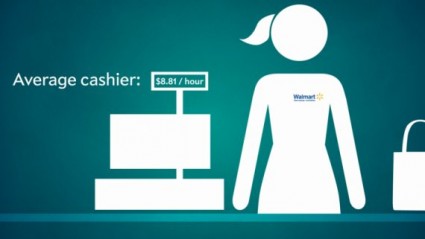April 6, 2015
(April 10, 2015: Correction to financial claims about Walmart. See below, after end of original article.)
By: Kelly Diamond, Publisher
 I’m sure many of you are aware of the “fairness” economists. Everything is measures by perceived “fairness”. For example, people who defend the Labor Theory of Value where the worth of something is based on how much effort and time the producer had to put in to provide that good or service. Never mind supply and demand, if someone had to toil over it, it’s worth more.
I’m sure many of you are aware of the “fairness” economists. Everything is measures by perceived “fairness”. For example, people who defend the Labor Theory of Value where the worth of something is based on how much effort and time the producer had to put in to provide that good or service. Never mind supply and demand, if someone had to toil over it, it’s worth more.
Well, the fairness economists have been giving Walmart hell for years. Let’s put aside the fact that it’s a large corporation for just a moment, because that doesn’t seem to be the issue. Walmart is often pitted against other large corporations and still comes out the bad guy. And the reason is usually based on compensation. The employees don’t make all that much… or the CEO makes too damn much. But looking at the outcome without looking at what lead to it is excluding a huge middle. That middle carries the cause counterpart to the effects they see.
For example, Walmart was contrasted with Costco. The CEO of Costco doesn’t make nearly as much as the CEO of Walmart, and his compensatory package for his employees is higher… therefore, what? Walmart sucks. But wait! What is the real economic relationship between CEO and employee in each business?
- Doug McMillon, CEO of Walmart made approximately $25.3 million in 2014; approximately $2 million was cash compensation. (Source: Salary.com)
- Walmart employs roughly 2.2 million people around the world; 1.6 million just in the United States.
- Craig Jelinek, CEO of Costco made approximately $5.6 million in 2014; approximately $0.76 million was cash compensation. (Source: Salary.com)
- Costco employs roughly 174,000 people.
So how much do they “exploit” their respective employees? Well, on average, Walmart’s CEO makes about $11.50/employee per year if you include stock options; Costco’s CEO makes $32.18/employee. If Costco were to expand to a Walmart level proportionately, he would be making $70.8 million per year; and if Walmart shrank proportionately to Costco’s level, the CEO would be making $2 million per year.
If I take the argument that CEOs are making money off the backs of their employees, and how much is the metric by which we measure their evil, then Costco is nearly three times worse than Walmart! But people sing the praises of Costo despite how few people they employ, and how limited their selection and hours of operation are.
And what would they have Walmart do? Should the CEO just not make anything and hand it all over to the employees? Ok. That would only give everyone an $11.50/year raise. Interestingly enough less than 0.5% of Walmart’s employees make minimum wage. And if they go full time, they make over $11/hour. If they commit to the company, and work their way up to say a general manager, they make close to six figures. In the case of Doug McMillon, he started as a summer associate at a Walmart distribution center and worked his way up.
This happened again, when Walmart was pitted against Apple. Apple is the tech of choice for many of these indignant anti-capitalists. There’s plenty of time to choke on the irony later.
The net profits of Walmart in the most recent quarter are 3.12% while Apple made 24.2%. According to an analysis done by the American Economic Institute, it takes Walmart 30 days to recoup the COSTS of doing business… and on the 31st day they make a profit. Imagine busting your ass for 30 days at a loss, for that ONE day of profit at the end, and then starting all over again. Imagine being an employee who gets paid every 31 days! No one would stand for it. But it’s okay that a business does this.
Meanwhile, Apple makes its money in about 3 weeks and profits the last week of every month.
There is clearly a market for cheap goods. That market of people are willing to forgo awesome service and quality for their purposes. Would people like to have amazing service, only get premium quality in every single thing they buy at ridiculously low prices, and the convenience of having their every need met at one location? Without question. But when choices between convenience, service, quality and price have to be made, how will the market prioritize it from most important to least? People who shop at Walmart are often willing to forgo service and quality for convenience and price. Please who shop at Nordstrom’s value quality and service over lower prices.
There is clearly a high demand for Walmart: for their jobs and their products. Walmart makes its money in volume, and plays the long game. It’s willing to wait 31 days to make its profit. While Walmart is condemned for not offering a “living wage” to a very small percentage of its employees, it provides “living price points” to a far greater population.
If Walmart even decided not to make a dime in profit and instead gave its entire quarterly net profit to its employees. It would amount to a little over a dollar per quarter. So if the CEO gave 100% of his compensation back to the employees, and the Walmart corporation gave 100% of its net profits back to the employees, it would amount to a raise of about $15 per year per employee!
The only alternative is to shut down stores, shrink its employee base, and spread the wealth that way. It might cost a few jobs and eat into the salaries of others, but fair is fair right? I mean, that’s what people praise Costco and Trader Joe’s for!
4/9/15 Correction:
It was rightly pointed out to me that my numbers were off in assessing Walmart’s net income by a reader. I want to thank him for that, as it was a gross mistake on my part, and deserving of a correction statement.
The figures offered in the American Enterprise Institute’s article were in thousands (000), so the profits were in billions, not millions as I had incorrectly assumed.
So to rework this correctly, if we took $16,363,000,000 and just evenly distributed it among the 2.2 million employees of Walmart, that would amount to an additional $7,437 per year per employee… which is considerable and certainly would put those working at $8.25/hour at a more livable or manageable wage. While that’s nice, Walmart would cease to exist shortly after such a stunt as its shareholders would not be very pleased. That is indeed a delicate balance.
Cannibalizing your employer seems a rather short-sighted solution to the struggling class of folks out there.
The difference in numbers certainly doesn’t shake my defense of the company. It absolutely provides goods and services that are in high enough demand that they can afford not to profit but 12 days a year.




